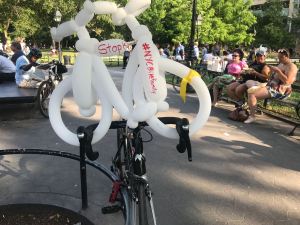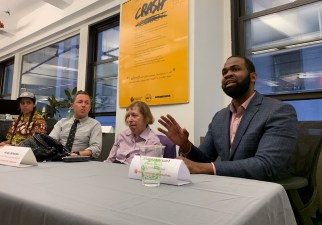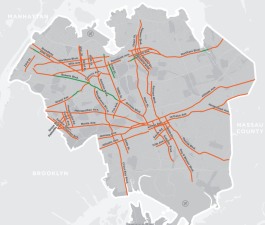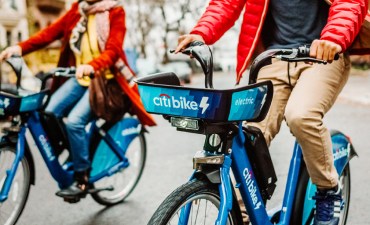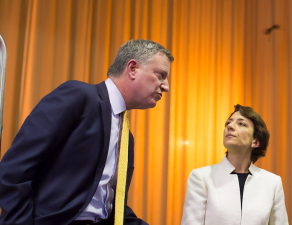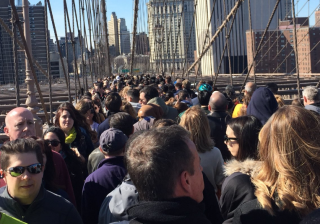STREETS WEEK! While Touting Support for Cycling, Mayor Considers Something that Would Undermine It
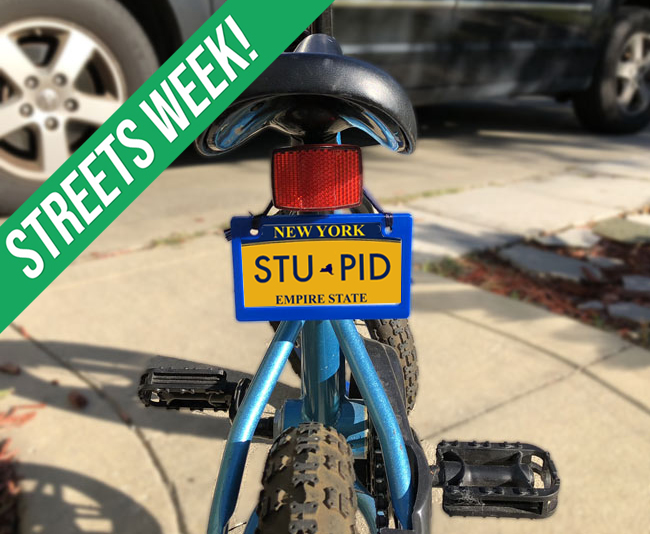
On the third day, de Blasio created fake news about cycling.
In the midst of a much hyped Streets Week! initiative designed to show mayoral support for cycling and sustainable transportation, Mayor de Blasio again gave aid and comfort to anti-cycling activists and mainstream media reporters, saying that registering bicycles with license plates should be “considered.”
In response to a question from WCBS2’s Marcia Kramer, who claimed that cyclists need to be reined in with registration, the mayor resorted to language he often chooses when he wishes to counter the also-specious claim that his administration is engaging in a war on cars.
“We have to do a better job at educating everyone to their responsibilities,” Hizzoner said after first celebrating the rise in cycling. “I think ideas like license plates certainly need to be considered, because we are going into a new world where more and more people are biking, and that’s great. And in some ways we need to catch up to that reality and that’s the kind of idea that needs to be explored.”
In a follow-up question, Streetsblog asked de Blasio why — just three days into his own Streets Week! — would he even consider a registration system, which has shown to reduce cycling and leads to more encounters between police and cyclists of color. And, in fact, cyclists are subject to the same tickets as drivers — and often receive them.
“This is what I regard as common sense,” the mayor said (after first addressing this reporter as “dear friend”). “As more and more people use bikes, it’s the kind of thing we should look at.”
He added, “I don’t accept the simple orthodoxy” that suggests that bike registration would lead to reduced cycling and therefore less safety for cyclists because of the loss of the safety-in-numbers affect.
“I don’t think that’s proven or even provable,” he added.
Research does indeed show that registration reduces cycling (and other studies show it costs a municipality more to administer a registration system than it brings in in fines).
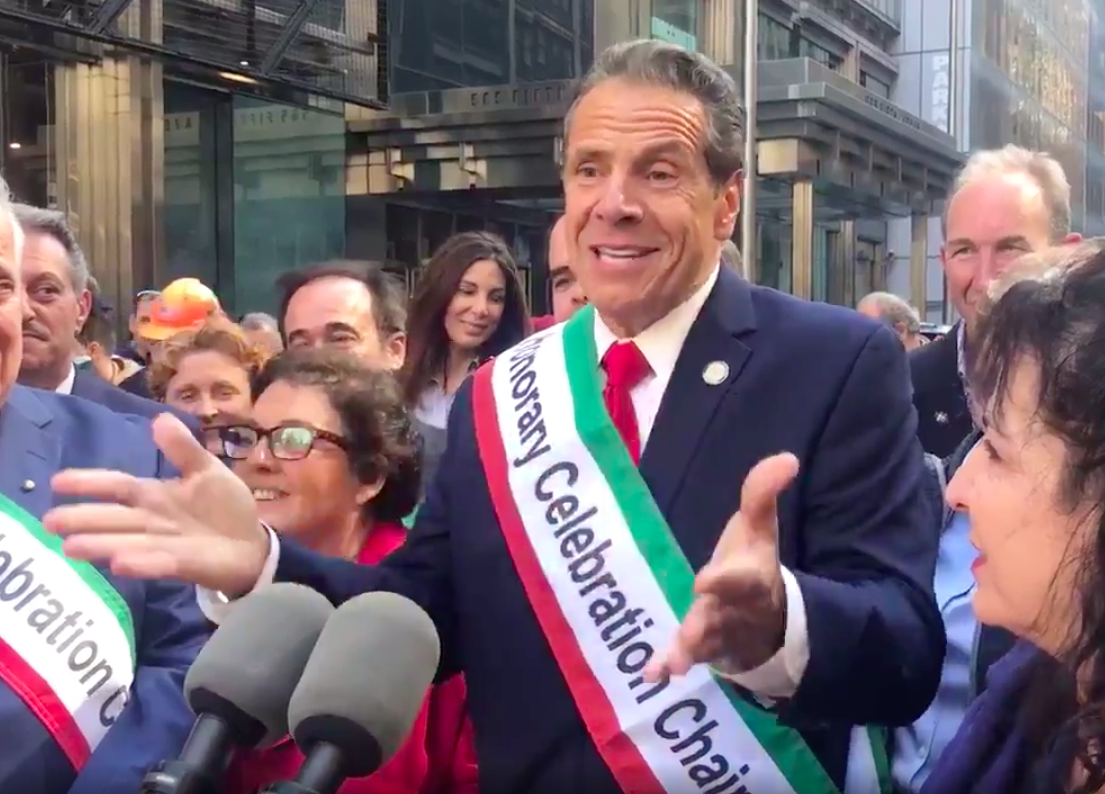
Of course, by citing his superior “common sense,” the mayor simply put himself in the company of a huge number of men in politics who think their lived experience or perceptions trumps knowledge or science. For example, Gov. Cuomo appealed to common sense when he wrongly claimed in 2019 that his widened Koscuiszko Bridge would eliminate congestion (it made it worse, as the scientifically verified rule of induced demand predicted … if he had only listened).
Left unsaid in the Wednesday morning discussion discussion was the other danger of registering bikes: racial bias in how rules are enforced against cyclists, especially younger cyclists. As Streetsblog has reported, Black youths are far more likely to be targeted by police for summonses for riding on the sidewalk. And Bloomberg reporter Sarah Holder documented more examples in her deep dive on police misconduct after the mass harassment of black teen cyclists in Perth Amboy.
We can’t even ride bikes now… I’m not surprised. I’m just angry. pic.twitter.com/xcAR8zmnuP
— Caramel skin ass dude! (@deep_dab) April 19, 2021
Holder’s story offered a wealth of statistics to demonstrate the discriminatory nature of bicycle enforcement, including an analysis from Bicycling magazine that showed Black riders in Oakland, New Orleans, and Washington, D.C. were more likely to be stopped than White riders and that “most stops occurred in Black neighborhoods.”
And a 2013 report in Miami New Times revealed that 86 percent of bike citations in Fort Lauderdale went to Black cyclists over a three-year period — with almost no tickets written in White neighborhoods.
And in Dallas, police were very selective, shall we say, in their enforcement of helmet laws, the Morning News reported. In Seattle, the racial bias on helmet enforcement was so bad that it has prompted calls this year to scrap the King County rules, The Seattle Times reported.
“Where there’s discretion, there’s discrimination,” Barry Friedman, the director of NYU Law’s Policing Project, told Holder.
Has the mayor ever heard of a place called Perth Amboy? https://t.co/rtj9BRLBJN
— Shabazz Stuart (@ShabazzStuart) May 12, 2021
Activists were surprised that de Blasio had taken Kramer’s bait.
“We’re obviously in a time when government should be encouraging and supporting bike riding, not bureaucratizing it and exposing riders to random or selective police enforcement,” said Bike New York spokesman Jon Orcutt. “We’d like to see policy go in the other direction — suggested by [mayoral candidate] Kathryn Garcia — of eliminating minor rulebook stuff like the bike bell requirement.”
Transportation Alternatives also tweeted a thread to remind the mayor of the dangerous waters into which he had waded.
FACT: Bike licensing laws are a recipe for discriminatory police enforcement. They would destroy New York's bike boom and fill our streets with more car congestion.
To get people to bike safer, build better infrastructure. It's that simple.https://t.co/bGElZJAbDB
— Transportation Alternatives (@TransAlt) May 12, 2021
Nonetheless, hours after the mayor’s comments, the controversy grew to involve Department of Transportation Commissioner Hank Gutman, who was asked for his opinion at an unrelated (or was it?) bike corral installation in Queens. He first pointed out that licensing would require Albany approval before getting to his larger point.
“Let me get to the point that the mayor might have been addressing, which is the importance of education and responsible conduct by everyone who shares our streets,” Gutman said. “Pedestrians, cyclists, e-mobility people, drivers of cars, drivers of trucks.”
https://twitter.com/BrooklynSpoke/status/1392597152765972488?s=20
He added that the de Blasio administration added money to the budget for Vision Zero education (the DOT press shop later told us that the federal stimulus allowed City Hall to add $2 million to the education budget).
“If educating cyclists to be careful, to protect themselves. When I learned how to drive a car many years ago, they taught us defensive driving. Assume the other guy is going to do something stupid and be prepared to deal with it. I think that’s good advice for cyclists, too, and pedestrians. Put away your cellphone. Watch what you’re doing. This isn’t blaming victims. This is about trying to save their lives. Because being right or wrong may matter to the personal injury lawyers, but if you’re dead, it isn’t going to matter to your family. So we are all in favor of education. That’s my take on it.”
It’s worth noting that Gutman’s answer (and Kramer’s question itself) seemed based on a major fallacy: that cyclists are striking and killing or injuring pedestrians in high numbers. The Department of Transportation’s own data show that since 2006, drivers have killed 2,116 pedestrians. In the same period, cyclists have killed 10 pedestrians, or .47 percent.
